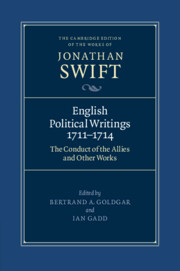Book contents
- Frontmatter
- Contents
- List of Illustrations
- General Editors’ Preface
- Acknowledgements
- Chronology
- List of Abbreviations
- Note
- Introduction
- The Conduct of the Allies
- Some Advice Humbly Offer’d to the Members of the October Club
- Some Remarks on the Barrier Treaty
- The New Way of Selling Places at Court
- Some Reasons to Prove . . . In a Letter to a Whig-Lord
- It’s Out at Last: Or, French Correspondence Clear as the Sun
- A Dialogue Upon Dunkirk, Between a Whig and a Tory
- A Hue and Cry After Dismal
- A Letter From the Pretender, to a Whig-Lord
- A Defence of Erasmus Lewis, or The Examiner (2 February 1713)
- Vote of Thanks by the House of Lords (9 April 1713) and The Humble Address of the . . . Lords (11 April 1713)
- The Importance of the Guardian Considered
- The Publick Spirit of the Whigs
- A Discourse Concerning the Fears From the Pretender
- Some Free Thoughts Upon the Present State of Affairs
- Some Considerations Upon the Consequences Hoped and Feared from the Death of the Queen
- Contributions to the Post Boy and the Evening Post
- Textual Introduction and Accounts of Individual Works
- Textual Introduction Ian Gadd
- The Conduct of the Allies: Textual Account
- Appendix: Transcripts of the British Library Manuscripts of the Vote of Thanks and The Humble Address of . . . the Lords
- Bibliography
- Index
Introduction
Published online by Cambridge University Press: 02 September 2021
- Frontmatter
- Contents
- List of Illustrations
- General Editors’ Preface
- Acknowledgements
- Chronology
- List of Abbreviations
- Note
- Introduction
- The Conduct of the Allies
- Some Advice Humbly Offer’d to the Members of the October Club
- Some Remarks on the Barrier Treaty
- The New Way of Selling Places at Court
- Some Reasons to Prove . . . In a Letter to a Whig-Lord
- It’s Out at Last: Or, French Correspondence Clear as the Sun
- A Dialogue Upon Dunkirk, Between a Whig and a Tory
- A Hue and Cry After Dismal
- A Letter From the Pretender, to a Whig-Lord
- A Defence of Erasmus Lewis, or The Examiner (2 February 1713)
- Vote of Thanks by the House of Lords (9 April 1713) and The Humble Address of the . . . Lords (11 April 1713)
- The Importance of the Guardian Considered
- The Publick Spirit of the Whigs
- A Discourse Concerning the Fears From the Pretender
- Some Free Thoughts Upon the Present State of Affairs
- Some Considerations Upon the Consequences Hoped and Feared from the Death of the Queen
- Contributions to the Post Boy and the Evening Post
- Textual Introduction and Accounts of Individual Works
- Textual Introduction Ian Gadd
- The Conduct of the Allies: Textual Account
- Appendix: Transcripts of the British Library Manuscripts of the Vote of Thanks and The Humble Address of . . . the Lords
- Bibliography
- Index
Summary
The Conduct of the Allies, Tory politics, and the Barrier Treaty
On 8 September 1711 Swift, in a letter to his friend Charles Ford, remarked casually of Queen Anne, ‘I find no body expects she can live long; and that is one great Reason why they would hasten a Peace.’ Then he adds, ‘’Tis thought by State Astronomers that we shall have a scribbling Winter; but perhaps I shall then be far enough off’, and finally, before his adieu, ‘I am at least twice oftner with th[e] M—rs than when you was here, yet You see nothing comes of it’ (Woolley, Corr., vol. I, p. 381). These lines can all serve in some ways as keynotes for his life that autumn. Whatever the Queen's health, the movement towards Peace which would culminate in the treaty of Utrecht in 1713 was on its way; it was indeed a scribbling winter with Swift as a major scribbler; and though his familiarity with the chief ministers Harley and St John had not yet produced the preferment he was hoping for, what did come of it was his place as the most successful political writer of the Queen Anne period, a period dominated in its final years by the two overriding issues of the peace and the Succession.
Swift was ready for an important new task. On 7 June he had published the last Examiner paper totally his own, a review of the accomplishments of the Tory Parliament which was to end five days later; and though there was no announcement that he would be succeeded by another hand, Swift did say that the main design he had had in writing those papers had been now ‘fully executed’ (Ellis, Examiner, p. 470). Though perhaps he did not know it in June, by September he had an important new assignment. On the next day after writing to Ford, in fact, Swift in his Journal mentions to Stella that he had hoped to stay atWindsor a week ‘to be at leisure for something I am doing’ (Williams, JSt, p. 356). The nature of that ‘something’ was made very clear in his comments to her over the next month. On the 28th he wrote to her, ‘We have already settled all things with France, and very much to the honour and advantage of England; and the queen is in mighty good humour.
- Type
- Chapter
- Information
- English Political Writings 1711–1714'The Conduct of the Allies' and Other Works, pp. 1 - 44Publisher: Cambridge University PressPrint publication year: 2008

